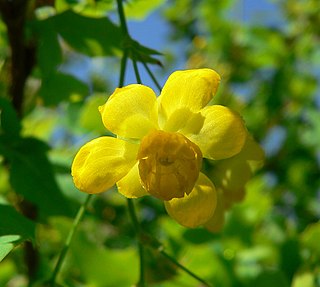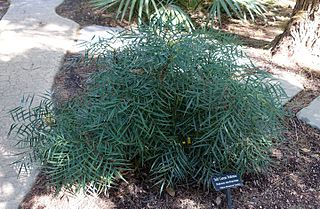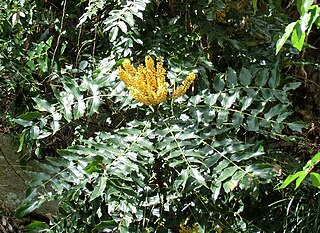
Mahonia is a formerly accepted genus of approximately 70 species of shrubs or, rarely, small trees with evergreen leaves in the family Berberidaceae, native to eastern Asia, the Himalaya, North America, and Central America. They are closely related to the genus Berberis and as of 2023 the majority of botanical sources list it as a synonym for Berberis.
Berberis taronensis is a shrub in the Berberidaceae described as a species in 1941. It is native to Tibet and Yunnan in China.
Berberis decipiens is a species of shrub in the Berberidaceae described as a species in 1913. It is endemic to Hubei Province in China. The species is listed as vulnerable by the IUCN.

Berberis fremontii is a species of barberry known by the common name Frémont's mahonia.

Berberis japonica is a species of flowering plant in the family Berberidaceae, native to Taiwan. Despite the name, it is not native to Japan, though it has been known in cultivation there for centuries. The wild origins of this species have long puzzled botanists, but wild plants in Taiwan, previously known under the name Mahonia tikushiensis, appear most similar to the cultivated forms of B. japonica.

Berberis fortunei is a species of shrubs in the family Berberidaceae, the barberry family, described as a species in 1846. It is endemic to China, found in the provinces of Chongqing, Guangxi, Guizhou, Hubei, Hunan, Jiangxi, Sichuan, Taiwan, and Zhejiang. It is grown as an ornamental in many lands, with common names including Chinese mahonia, Fortune's mahonia, and holly grape.

Berberis haematocarpa, Woot. with the common names red barberry, red Mexican barbery, Colorado barberry and Mexican barberry, is a species in the Barberry family in southwestern North America. It is also sometimes called algerita, but that name is more often applied to its relative, Mahonia trifoliolata.
Berberis wilcoxii is a shrub native to Arizona, New Mexico and Sonora. It is up to 2 m tall, with pinnately compound leaves of 5-7 leaflets, densely clustered racemes and ovoid berries up to 10 mm long. It is generally found in rocky canyons in mountainous areas at an elevation of 1700–2500 m.
Berberis muelleri is a shrub with compound leaves, native to the Mexican State of Nuevo León.
Berberis pumila is a species of shrub native to Oregon and northern California. It is found in open woods and rocky areas at an altitude of 300–1,200 m (980–3,940 ft) in the Coast Ranges, the northern Sierra Nevada and the southern Cascades, often on serpentine soils.
Berberis bracteolata is a shrub in the Berberidaceae described as a species in 1917. It is endemic to China, known from Sichuan and Yunnan Provinces.
Berberis breviracema is a shrub in the Berberidaceae described as a species in 1985. It is endemic to China, native to Guangxi and probably Guizhou Provinces.

Berberis eurybracteata is a species of shrub in the Berberidaceae described as a species in 1901. It is endemic to China.
Berberis fordii is a species of shrub in the Berberidaceae described as a species in 1913. It is endemic to China, found in Chongqing and Guangdong Provinces.

Berberis gracilipes is a shrub in the family Berberidaceae, first described in 1887. It is endemic to China, native to the Sichuan and Yunnan Provinces.
Berberis hancockiana is a species of flowering plant in the family Berberidaceae, first described in 1917. It is endemic to Yunnan Province in southwestern China.
Berberis leptodonta is a shrub in the family Berberidaceae, first described in 1938. It is endemic to China, found in Sichuan and Yunnan Provinces.
Berberis longibracteata is a shrub in the family Berberidaceae, first described as a species in 1917. It is endemic to China, found in Sichuan and Yunnan Provinces.

Berberis napaulensis Nepali: जमाने मान्द्रो is a shrub in the family Berberidaceae described as a species in 1821. It is native to China and the Himalayas. This species is used medicinally throughout the Sikkim Eastern Himalayas.
Berberis everestiana is a shrub in the family Berberidaceae described as a species in 1961. It is native to the Himalayas of Tibet and Nepal at elevations of 3800–5000 m.







